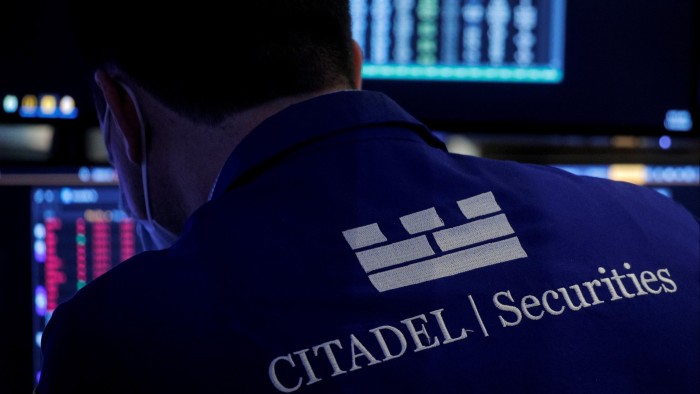Unlock the Editor’s Digest for free
Roula Khalaf, Editor of the FT, selects her favourite stories in this weekly newsletter.
Ken Griffin’s Citadel Securities has bought Morgan Stanley’s electronic options market making business, underscoring how high-frequency trading firms now dominate an industry once ruled by Wall Street banks.
Citadel purchased both the underlying business from Morgan Stanley and a large options position, said a person familiar with the matter.
The tie-up highlights how high-frequency trading firms are playing an increasingly important role on Wall Street, leveraging powerful computers to buy and sell financial products such as stocks, bonds and derivatives.
Citadel executed more than 20 per cent of overall US equities volumes and said it was the number one US equity options specialist in the first quarter, the Financial Times has previously reported. The group posted profits of $1.7bn in the first three months of this year.
Banks have struggled to compete with the likes of Citadel, Jane Street and Susquehanna in the world of electronic trading, which requires enormous investment in technology and huge order volumes to justify the cost. Traditional lenders began pulling back from the market following reforms put in place following the 2008 financial crisis.
Much of the trading done by everyday retail investors is facilitated by these high-speed trading groups whereas Wall Street banks including Morgan Stanley and Goldman Sachs focus on structuring more complex transactions for institutional clients. Goldman ceased making markets on US options exchanges in 2017.
The electrification of trading has helped to substantially lower the cost of share dealing but the industry has faced scrutiny over how it uses customer data.
Cboe Global Markets, which owns the Chicago Board Of Options Exchange, said in a filing last week that it had received a proposal from Morgan Stanley to transfer its designated primary market maker, a unit that facilities trading in options, to Citadel.
Options trading has grown particularly popular with retail traders, who use the derivative contracts that give the holder the right to buy or sell an asset at a certain price, to take larger bets on stocks.
Morgan Stanley declined to comment. News of the sale was reported earlier by Bloomberg.

